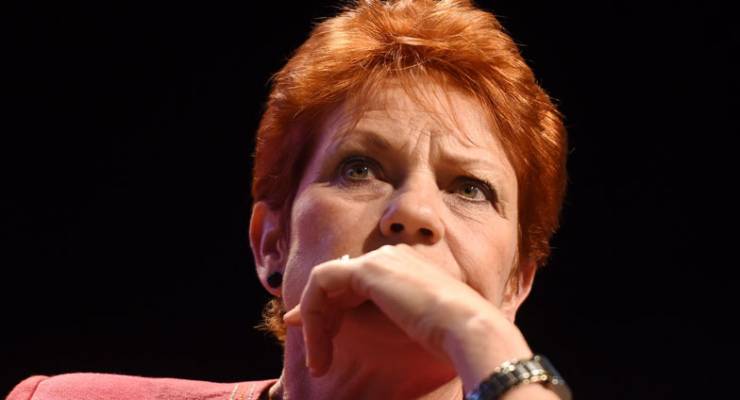
The One Nation renaissance is once again inviting comparisons to Groundhog Day, as the party faces the possibility of deregistration in Queensland over irregularities in its legal structure.
The latest development adds to an accumulation of bad news not just for One Nation, but also for Queensland’s Liberal National Party opposition, which has been hoping that One Nation will provide the key to a quick return to office after its shock defeat in January 2015.
At issue is the registration of One Nation Queensland Division as an incorporated association in November, the principal benefit of which is that members of the party executive will not be exposed to personal liability for legal action against the party, so long as they are judged to have acted in good faith.
Since the move did not involve changes to the party’s state constitution and regulations, it was evidently deemed to be no concern of the Electoral Commission of Queensland, which must be informed of changes to party constitutions under pain of deregistration.
But according to business regulation specialist Tom Ravlic, who wrote at length on the matter for The Saturday Paper, the party’s incorporation under the model rules provided to make life easy for small clubs and societies means it now has a “foundation governance document” that potentially fails to meet the requirements of the Electoral Act.
[Former One Nation heavyweights call for inquiry in wake of Four Corners report]
Labor Senator Murray Watt has moved quickly to refer the matter to Queensland’s Electoral Commissioner, which could potentially torpedo the party just in time for an election that Premier Annastacia Palaszczuk is reportedly considering holding later this year.
Given the distinction between the party’s constitution and its rules of association, and the historic tendency of courts to deem that party internal matters are beyond their jurisdiction (albeit that this has come under challenge in recent decades), such an outcome is by no means assured.
Nonetheless, it’s remarkable that the party could potentially be in legal hot water over its organisational structure, considering the events surrounding the party’s deregistration in 1999 and Pauline Hanson’s related conviction (later quashed) and imprisonment in 2003.
It also adds to the accumulating impression of disarray following the party’s chaotic Western Australian election campaign, recurring embarrassments surrounding candidate selection, and an Australian Electoral Commission investigation into claims the party failed to disclose the gift of a light aircraft from a property developer.
Notwithstanding the party’s success in winning three upper house seats, the Western Australian result discredited the notion that its prospective support base is impervious to such concerns.
State-level polling trends provide further evidence that support for the party gets softer in proportion with its exposure to media scrutiny.
An aggregation of federal poll results conducted a month ago found the party was maintaining a consistent level of support in New South Wales, Victoria and South Australia.
But in Western Australia, where the party’s presence was one of the defining issues of an election campaign that ran through February to early March, its support slumped from a double-digit peak in late January to just 6% — a downward trend that has been maintained in polling conducted in April.
[Poll Bludger: making sense of the WA election result]
In Queensland, the other state where the party has been most visible, polling conducted by Galaxy Research last week for The Courier-Mail found One Nation had dropped three points since February on federal voting intention, from 18% to 15%, and six points on state voting intention, from 23% to 17%.
In terms of its potential parliamentary presence, there is a dramatic difference for One Nation between 23%, which equals its performance in 1998 when it won 11 seats, and 17%, which, in all but a scattered handful of seat, would reduce it to third place, beyond the help of preferences from the LNP.
With each point lost, the prospect of a One Nation crossbench delivering power to the LNP — either as a minority government or, as foreshadowed last November by former premier Campbell Newman, through a coalition arrangement — rapidly diminishes.
What’s more, the rest of the Galaxy numbers suggest the voters who are deserting One Nation are taking their business to Labor — just as they did in Western Australia.








I’ve read the article by Tom Ravlic in the Saturday Paper…sounds like a lot of trouble for the Phonies to me.
Couldn’t happen to a more deserving lot of ‘pretenders’, IMHO !
William…your last sentence shows surprisingly good judgement by some Qld voters!!
The more you hear about One Nation, the more its sounds like a business than a political party that allows members any kind of say re candidates and policies.
It’s interesting that James Ashby seems to be a part of this One Nation setup (after what he did to Peter Slipper) , it almost seems that him & PH seem to be like (troubled) magnets, they both don’t seem to understand the difference between a company & a political party, it is very clear they are going to end up in the place PH, & One Nation ended up last time. Begs the question if everything goes to the wall (again) how many opportunities will the parliament & Australian people be forced to give these 2 another a chance to reinvent themselves & take the taxpayers (again) & anyone that is silly enough to fall for their money grabbing ways/nonsense for a ride. Million $ question is when is enough, enough???
The thought of PHON voters “taking their business” to Labor was only because the WA Libs were such a bunch losers, charlatans & screw-ups whereas in Qld & federally they are … oh, good point.